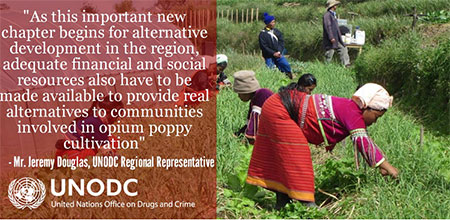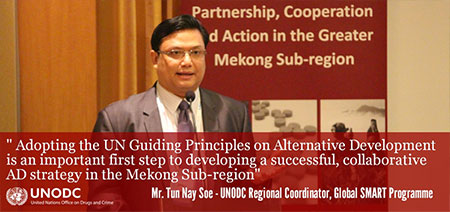
Bangkok (Thailand), 25 November 2015 - Opium poppy cultivation in the Greater Mekong Sub-region (GMS) remains a serious challenge. While the number of hectares of poppies planted fell each year from 2000-2006, it has risen significantly since and continues at high levels. The diverse set of factors encouraging the cultivation of opium poppies, alongside insufficient regional policy coordination, has made a lasting solution to poppy cultivation difficult to enact.
Alternative development (AD) is one solution that has been proven effective in countering opium poppy cultivation. However, on a regional level, the potential of AD as a long-term solution for reducing opium poppy production has not yet been harnessed. There remains a need to achieve greater consistency and regional synergy in alternative development projects, as approaches continue to vary significant between states, regions and countries within the GMS.
AD is a development oriented drug control approach that works to provide alternative sources of income for poppy farmers and those in poppy growing regions. AD projects also work to address unique circumstances in each poppy growing region that may lead to farmers growing poppies.
To further discussions related to AD in the GMS, UNODC held a meeting of signatories to the Mekong Memorandum of Understanding (MOU) on Drug Control. The meeting addressed regionalized challenges related to poppy cultivation and how AD could be better utilized in the GMS moving forwards. Specifically, the United Nations Guiding Principles on Alternative Development were identified as a platform through which regional gaps could be addressed.
"It is clear that more needs to be done to delineate best practices and approaches to alternative development at a regional level", said Mr. Jeremy Douglas, Regional Representative of UNODC to Southeast Asia and the Pacific. "The United Nations Guiding Principles on AD will allow the MOU countries to formulate coherent, holistic and successful AD strategies across the Sub-region."
Participants were also presented with UNODC's recently published working paper on alternative development in the GMS. The working paper, "Reframing Alternative Development in the Greater Mekong Subregion", works to further the discussion surrounding AD in the region through emphasizing its successes and looking towards how to build on these moving forward. Specifically, the report notes GMS countries should look to adopt the UN's Guiding Principles on AD consistently across the region.

The meeting was held as a side event during the International Conference on Alternative Development 2 (ICAD2) held this week in Bangkok, Thailand. The Conference worked to further the implementation of the Guiding Principles, and to facilitate the sharing of best practices and research related to alternative development.
The Mekong MOU brings together Cambodia, China, Lao PDR, Myanmar, Thailand and Viet Nam to address the threat of illicit drug production, trafficking and use in the GMS region. UNODC, a non-state signatory to the MOU, provides secretariat and technical support to the MOU process. Sustainable Alternative Development is the fifth thematic area of the MOU's mandate, and is geared towards eliminating illicit opium production by providing sustainable alternative livelihood opportunities for current / former opium producing communities.
To learn more about the MOU, its priorities and how it functions, http://www.unodc.org/southeastasiaandpacific/en/what-we-do/toc/mou.html
To download UNODC's Working Paper: Reframing Alternative Development in the Greater Mekong Subregion, click here.